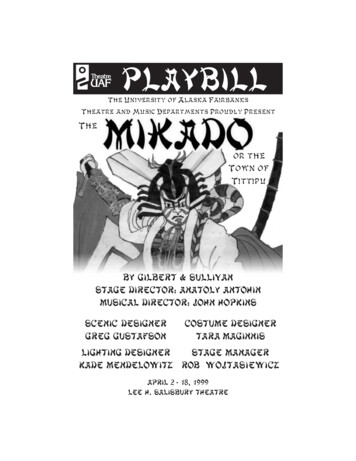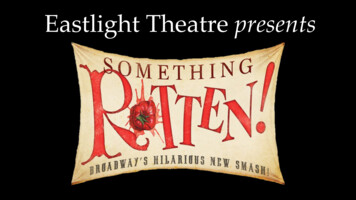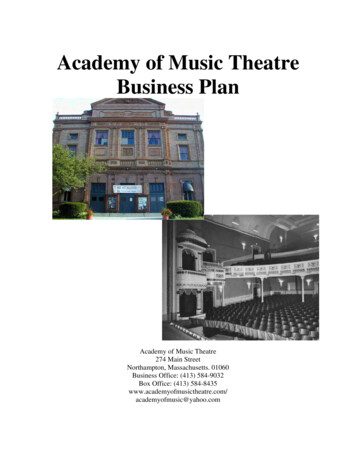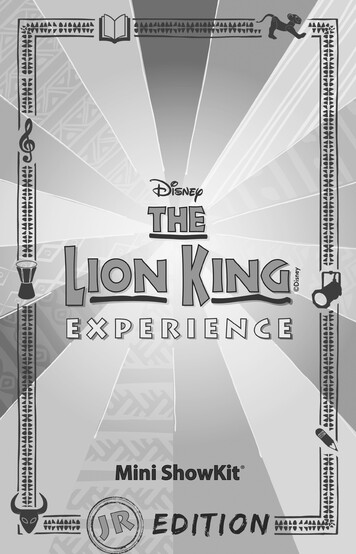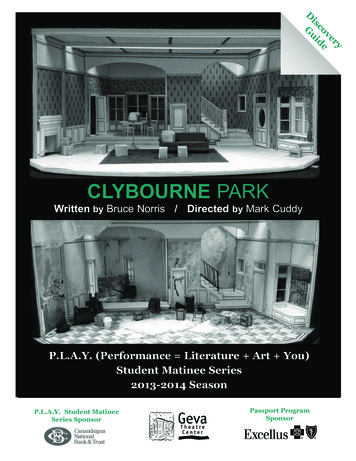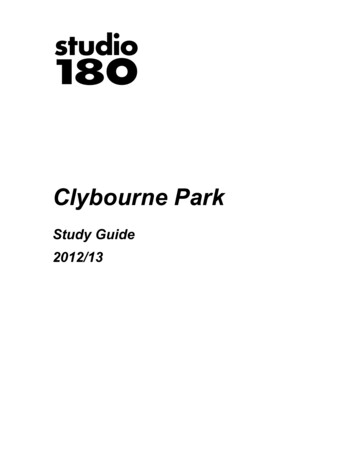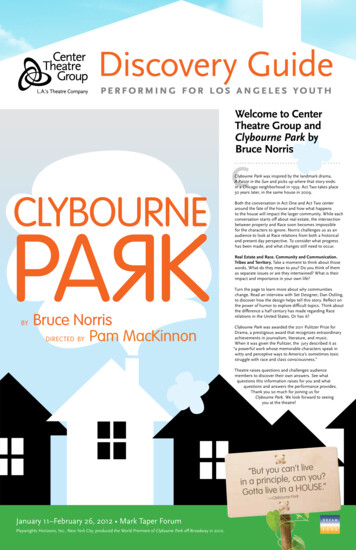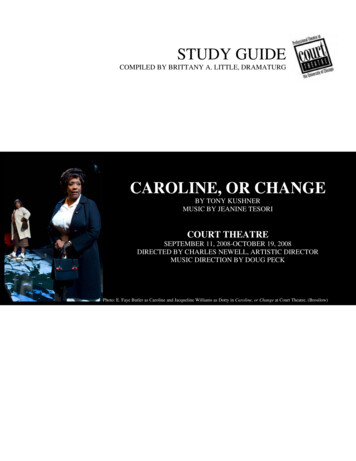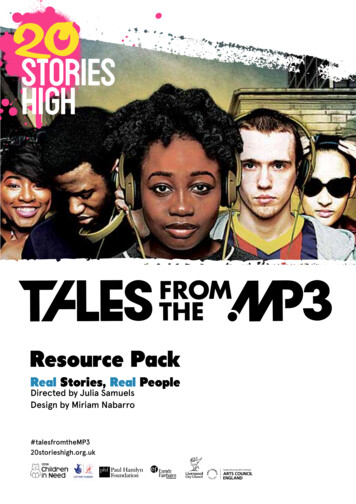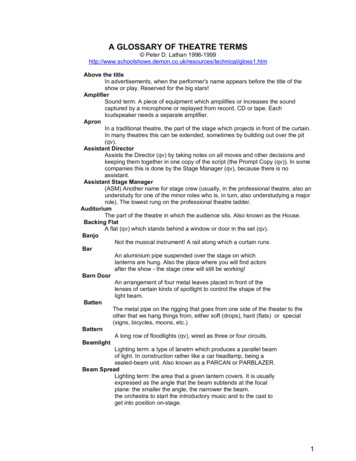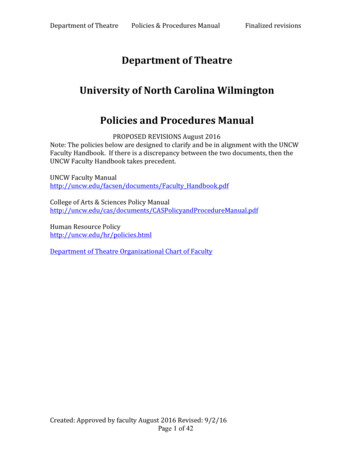
Transcription
Department of TheatrePolicies & Procedures ManualFinalized revisionsDepartment of TheatreUniversity of North Carolina WilmingtonPolicies and Procedures ManualPROPOSED REVISIONS August 2016Note: The policies below are designed to clarify and be in alignment with the UNCWFaculty Handbook. If there is a discrepancy between the two documents, then theUNCW Faculty Handbook takes precedent.UNCW Faculty Manualhttp://uncw.edu/facsen/documents/Faculty Handbook.pdfCollege of Arts & Sciences Policy ocedureManual.pdfHuman Resource Policyhttp://uncw.edu/hr/policies.htmlDepartment of Theatre Organizational Chart of FacultyCreated: Approved by faculty August 2016 Revised: 9/2/16Page 1 of 42
Department of TheatrePolicies & Procedures ManualFinalized revisionsTABLE OF CONTENTSPart I: General PoliciesChapter 1: Vision & Goals: Page 4Chapter 2: Planning, Assessment, objectives & Pedagogy: Page 5Chapter 3: Procedures and Protocols: Page 6Chapter 4: Student Scholarship & Awards: Page 7A: Student AwardsB: Student ScholarshipsPart II: The FacultyChapter 1: Faculty status, Rank & Responsibility: Page 9A: Faculty Status & RankA1 DefinitionA2 Full-TimeA3 Senior Faculty DefinitionA4 LecturersA5 Part-timeA6 EmeritusA7 The ChairB: Faculty Responsibility: Page 13B1 DefinitionB2 SyllabiB3 Classroom CoverageB4 Initiatives for New HiresB5 Mentoring Activities for Junior FacultyB6 Peer Evaluation of Teaching and Classroom ObservationB7 WorkloadStandardCredit Hour Equivalency (CHE)GuidelinesB8 Faculty DevelopmentB9 Student AdvisingB10 Faculty OfficesChapter 2: Annual Evaluation: Page 20A: The ChairB: Full-TimeC: Part-TimeD: Annual Review Criteria GuidelinesE: Annual Review DossierF: Teaching Evaluation PolicyChapter 3: Reappointment, Tenure and/or Promotion RTP: Page 26A: Philosophy & ProcessCreated: Approved by faculty August 2016 Revised: 9/2/16Page 2 of 42
Department of TheatrePolicies & Procedures ManualFinalized revisionsB: Department Criteria for Scholarship, Teaching & ServiceC: Recommendations for Junior Faculty MembersD: External Review PolicyE: Integration of Production Work into RTPChapter 4: Post Tenure Review PTR: Page 38Part III: Production: Page 40Chapter 1: Season Selectiona. Main Stageb. Second SeasonChapter 2: Student Lab SeriesChapter 3: Equipment UsageChapter 4 Production Policy & ProceduresPart IV: Forms: Page 42Annual Review FormTeaching Observation FormSample SyllabiSample Personal Development Plan (PDP)Other Forms?Created: Approved by faculty August 2016 Revised: 9/2/16Page 3 of 42
Department of TheatrePART IChapter 1: Vision & GoalsPolicies & Procedures ManualFinalized revisionsGENERAL POLICIESTheatre Department MissionOur mission is to provide high-level education and training in theatre art within thecontext of a liberal arts environment. We combine pre-professional training with asolid academic core in order to prepare our students for a range of outcomes: fromentry into the theatre and film markets to careers in related fields of communicationand other cognate disciplines. For theatre minors and general university students weoffer a range of production opportunities, as well as academic and active learningclasses to augment the student’s breadth of knowledge. For the universitycommunity and beyond we provide outreach programs along with an eclectic andengaging season of productions that promulgate our view of theatre as an art-formand a representation of humanity.VisionØ We educate a new generation of artists through close work with faculty andworking theatre and film professionals.Ø We provide the tools that enable students to conceive of numerous and variedpaths leading to traditional and nontraditional careers in the performing arts,along with the entrepreneurial skills and a professional network that facilitateentrance into the field.Ø We prepare liberal arts students with skills they learn in theatre studies –teamwork, goal generated techniques, discipline, research, problem solvingskills, and innovative thinking – for success in many fields and careers.Our vision entails several integral areas: A commitment to a distinctive and innovative curriculum Becoming a major destination theatre program with the region. Actively integrating our curriculum to embrace film, television and othermedia Fostering a spirit of joy, energy, and excitement in the work that we doTo achieve our vision we plan specific goals: Develop and execute successful outreach programs on multiple levels that linkUNCW theatre to the community and campus Develop and retain a strong faculty and staff committed to collaboration,collegiality and excellence Nurture and encourage alumni ties and local giving Build a more committed and confident sense of community within our theatrestudents Strive to meet high standards of excellence in our productions and otherpublic presentations of our program Collaborate and network with other departments to create diversity inpopulation and processesCreated: Approved by faculty August 2016 Revised: 9/2/16Page 4 of 42
Department of TheatrePolicies & Procedures ManualFinalized revisions Aggressively pursue new technologies and practices to ensure viability of ourstudents post-graduationPART IChapter 2: Planning, Assessment, Objectives & PedagogyDepartment Learning ObjectivesThe B.A. Theatre major is designed to help students to meet the following learningobjectives: An understanding of the historical development of theatre in western culture. An understanding of the historical context surrounding the development ofplaywriting, production design and technology, acting conventions, andtheatrical architecture. The ability to analyze plays in terms of form, style, structure, content, andstagecraft. An understanding of an audience’s awareness of how the elements ofdramatic literature and performance texts are integrated into theatricalproduction. An understanding of the roles of various theatre artists: playwright, producer,director, performer, scenic/lighting/costume/sound/multimedia designer,technical director, production manager, dramaturge, stage manager, etc.Students in the Performance Option will demonstrate the additional learningoutcomes: An appreciation and understanding of an actor’s ability to create a story,refine character development, define both the setting and time for a scene,assess a problem, and find creative solutions. An understanding of various performance techniques and styles through classdiscussion and critical feedback. The ability to use a combination of performance techniques in a theatricalproduction. A practical knowledge of the entertainment industry.Students in the Production Design and Technology Option will demonstrate theadditional learning outcomes: An appreciation and understanding of the role of the various artisans andcraftspeople and how their contribution impacts theatrical production. An appreciation and understanding of the historical development of theatricaldesign and technology, and of contemporary technology’s influence on bothproduction design and technology. The ability to practically apply learning outcomes received through traditionalCreated: Approved by faculty August 2016 Revised: 9/2/16Page 5 of 42
Department of TheatrePolicies & Procedures ManualFinalized revisionspractices of classroom lecture and through applied learning opportunities onall aspects of production.Students in the Customized Option will demonstrate the additional learningoutcomes: The ability to link theoretical and practical elements in the study of theatrewith a focus on playwriting, directing, or other aspects of theatricalproduction. The ability to research, write, and revise a critical scholarly paper on someaspect of theatrical production or dramatic literature. The ability to make an effective oral presentation of such research andwriting.Planning and AssessmentThe Theatre Department’s assessment program enables the department tocontinually assess student learning and revise its curriculum accordingly. Followingthe UNCW Division of Academic Affairs’ Guidelines for Annual Reporting of AssessmentActivities, the department regularly reports assessment results and programimprovements.The following instruments are used to assess whether students are meeting thedepartment’s learning objectives.Classes: See Class SLO Assessment Chart. This chart shows which classes aredelivering our SLO in the Core and in each option. SLO are measured by test andassignment scores and the average grades of those assignments are evaluated.Capstone Projects: Each option includes a capstone course that features a definingstudent project that aligns with the given option’s stated SLO’s.Note: As an applied learning program, assessment occurs throughout the course ofeach day for a majority of our students. Whether it be working in one of theproduction areas, or in rehearsal, students are afforded immediate feedback ontechniques and methodologies attempted. Although this assessment is informal innature, it is directly related to the practical application of knowledge received.PART IChapter 3: Procedures & ProtocolsDepartment committees and structureSeason Selection Committee: Department Chair, TechnicalDirector/Production Manager (chair of committee), Three additionalmembers (can be full or part-time faculty). The chair asks for volunteers andthen assigns a committee that will have a variety of viewpoints.Curriculum and Assessment committee: Assigned by Department Chair atstart of each academic year. Membership includes at least one faculty memberCreated: Approved by faculty August 2016 Revised: 9/2/16Page 6 of 42
Department of TheatrePolicies & Procedures ManualFinalized revisionsfrom each option (Performance, Design/Technology, and Customized). Mustbe tenure or tenure track.Policies and Procedures Committee (this includes mission and vision)Assigned by Department Chair at start of each academic year.Chair: A Senior Faculty MemberMembers: All Full-time faculty eligibleReappointment, Tenure, Promotion (RTP) Committee:Chair: Department Chair (non-voting)Members: All senior facultyAnnual Review Peer Committee: Shall be comprised of all senior faculty. Ifthe number of senior faculty members reaches six, the department chair mayopt to rotate membership on the annual review committee, with each seniorfaculty member serving every other year.Search Committees: Will be assigned by the Department Chair as needed.Search committee for the Department Chair Position shall be assigned by theDean of Arts & Sciences.Auxiliary Productions Committee: Will be assigned by the DepartmentChair. Committee should include the Production Manager and oneperformance faculty member. A third member may be appointed by the Chair.Will be responsible for Implementation of Auxiliary Productions. Example: 2ndseason, student lab, CAB afterhours, Stage Company etc.Enrollment/Recruitment Committee: Will be assigned by the DepartmentChair.PART IChapter 4: Student Scholarship and Awards and ScholarshipsA: Student AwardsPhilosophyEvery year the department honors exceptional students at an end ofthe year ceremony/party and confers student awards:Categories for nominees are:Most improved PerformanceMost Improved DTMVP PerformanceMVP DTBest All AroundRookie(s) of the yearAcademic AchievementOther categories may be proposed during nomination processEligibilityIn order to be eligible for an award, a student must be a declaredTheatre Major who has at least a 3.0 GPA overall and a 3.5 GPA inTheatre.Created: Approved by faculty August 2016 Revised: 9/2/16Page 7 of 42
Department of TheatrePolicies & Procedures ManualFinalized revisionsCriteria Most Improved Performance – Nominated by directors andperformance faculty. For the student that has demonstrateddedication to their training and has applied this training toimprove their skillsets. Most Improved DT - Nominated by the design and technologyfaculty. For the student that has demonstrated dedication totheir training and has applied this training to improve theirskillsets. MVP Performance - Nominated by directors and performancefaculty. For the student that has demonstrated outstandingleadership and ethic as a performance or a customized optionstudent. MVP DT - Nominated by directors or the design and technologyfaculty. For the student that has demonstrated outstandingleadership and ethic as a designer / technician or as a designand technology or a customized option student. Best All Around – Nominated by the faculty. For the studentwho has exhibited outstanding service and leadership to thedepartment throughout their tenure within the university. Rookie(s) of the Year – Nominated by the faculty. For studentsthat have demonstrated, during their first year, commitment tothe department’s production program. Academic Achievement - Nominated by the faculty. For studentthat has excelled academically in the classroom.B: Student ScholarshipsThe Department of Theatre currently offers four opportunities to apply forscholarship resources. A general call for applications, with accompanyingguidelines are sent to Theatre Majors via their university email. Thesescholarships may vary depending on the availability of funds to support them.a.b.c.d.Kathleen Price Bryan ScholarshipThe Doug Swink ScholarshipThe Nikkita Donyal Johnson Diversity ScholarshipThe Terry Rogers AwardPART II: THE FACULTYCreated: Approved by faculty August 2016 Revised: 9/2/16Page 8 of 42
Department of TheatrePolicies & Procedures ManualFinalized revisionsChapter 1: Faculty Status, Rank & ResponsibilitiesA: Faculty StatusA1: The FacultyThe university's faculty, broadly defined, consists of all full-time and part-timemembers of the teaching, research, or administrative staff who hold anacademic title, including those on special faculty appointment.Tenured and tenure-eligible ranks are professor, associate professor, andassistant professor.Adjunct and part-time members of the facu
The B.A. Theatre major is designed to help students to meet the following learning objectives: An understanding of the historical development of theatre in western
